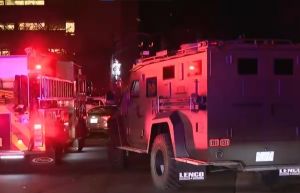The death toll in the Washington state mudslide that occurred last weekend has risen to 24, authorities said Tuesday.
But scores more are still missing as a result of the slide, caused by a collapsed hill that brought down an enormous amount of mud on the village of Oso, about 55 miles from Seattle.
The bodies were found in the wreckage, Snohomish County Fire District Chief Travis Hots said, the Associated Press reported. Over 200 responders from local, state and federal levels are helping to search through the debris left by the 30 homes that were destroyed.
But continuous rainfall has delayed rescue efforts and nearly 176 people are still missing. That number is expected to decrease due to duplicate reports of missing persons and others being reported safe, according to the AP.
Elaine Young, who survived, told the AP she heard a "whoosh" noise before the mudslide. Young thought it was a chimney fire, but when she walked outside she saw an enormous wall of mud behind her home. Nearby, a body was found underneath several uprooted trees.
The slide was caused by weeks of heavy rainfall, David Montgomery, a University of Washington Earth and space sciences professor, told the AP. The slide was at least 135 feet wide and 180 feet deep.
Experts say the area in Oso was prone to mudslides, and that a disaster of this magnitude was bound to happen. A 1999 report submitted to the U.S. Army Corps of Engineers said the area had "the potential for a large catastrophic failure," The Seattle Times reported.
But Public Works Director Steve Thomsen told The Seattle Times he did not know about the 1999 report.
"A slide of this magnitude is very difficult to predict," Thomsen said. "There was no indication, no indication at all."
Officials say though it is unlikely they will find many survivors, they are still labeling the search as a rescue and recovery mission.
"I've said it before- I believe in miracles," John Pennington, director of Snohomish County Emergency Management, said according to USA Today. "I believe that people can survive these events."
© 2025 HNGN, All rights reserved. Do not reproduce without permission.








